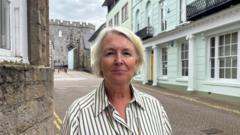Is Misinformation Fueling the Asylum Hotel Debate?

Published: 2025-09-17 22:00:25 | Category: wales
Concerns about rising misinformation regarding hotels housing asylum seekers in Wales have prompted community leaders and local authorities to take action against false narratives. The Welsh Local Government Association (WLGA) has highlighted that speculation and false information can lead to unnecessary anxiety and community tensions. This article delves into the growing issue of online misinformation, the current status of asylum seekers in Wales, and the implications for local communities.
Last updated: 12 October 2023 (BST)
Key Takeaways
- Community leaders in Wales report an increase in misinformation about asylum seeker hotels.
- The WLGA warns that false narratives can cause unnecessary concern and community tensions.
- As of now, 76 asylum seekers are housed in Cardiff hotels, with a broader context of 32,059 across the UK.
- The UK government aims to close all asylum hotels by 2029, down from over 400 in mid-2023.
- Local authorities have had to issue statements to refute false claims regarding asylum hotels in various regions.
The Growing Concern of Misinformation
Asylum seekers have been a contentious topic in the UK for years, with rising numbers prompting varying responses from the government and local communities. Recently, community leaders in Wales have expressed alarm over a significant increase in online misinformation regarding the housing of asylum seekers in hotels. This trend is particularly concerning given the potential for such misinformation to escalate into community unrest.
The Role of Local Authorities
Local authorities, including those in Anglesey and Merthyr Tydfil, have found themselves compelled to issue official statements to counter false claims about the housing of asylum seekers. For instance, Sian Gwenllian, a Member of the Senedd (MS) for Arfon, has noted that dangerous rumours have circulated in her constituency, leading to heightened anxiety among residents. Such misinformation not only misrepresents the situation but can also create unnecessary tension between communities and individuals.
Political Implications and Misuse of Misinformation
Gwenllian has also highlighted a worrying trend where some politicians appear to be exploiting misinformation for their own political gain. This manipulation of facts can further divide communities and exacerbate pre-existing tensions. The WLGA emphasises that such misinformation, when unchecked, can lead to unintended consequences, impacting not just the individuals directly involved but also the wider community.
Current Asylum Seeker Statistics in Wales
Understanding the statistics surrounding asylum seekers is crucial for contextualising the current situation in Wales. According to the latest figures from the Home Office, there are approximately 32,059 asylum seekers housed in hotels across the UK. However, Wales accounts for only 76 of these individuals, all of whom are located in Cardiff. This figure highlights the relatively small number of asylum seekers in Wales compared to the national total.
Broader Context of Asylum Applications
In the year leading up to June, the UK saw a staggering 111,000 asylum applications. This high number reflects ongoing challenges within the asylum system and the pressures it places on local services and communities. The Welsh Refugee Council, which assists newcomers to Wales, has voiced concerns about the misinformation surge, reiterating the need for accurate information to foster understanding and community support.
The UK Government's Response
In response to the growing concerns about asylum seekers, the UK government has announced plans to significantly reduce the number of hotels used for housing them. The current aim is to close all asylum hotels by 2029, with a reduction from over 400 to fewer than 210 hotels already achieved. The government has stated that it is committed to addressing the asylum system's challenges and has begun returning individuals without the right to remain in the UK.
Financial Implications of Housing Asylum Seekers
The financial burden of housing asylum seekers in hotels has been considerable, costing nearly £9 million per day at the height of the crisis. The decision to close hotels is part of a broader strategy to mitigate these costs and reform the asylum system. This commitment to reform is critical, given the significant public funds involved and the need for effective management of asylum applications.
Community Concerns and the Need for Accurate Information
As misinformation continues to circulate, community leaders are urging the public to rely on verified sources for information about asylum seekers. The WLGA has reiterated the importance of combating false narratives, noting that misinformation can escalate fears and community tensions, particularly in areas where asylum seekers are housed.
Encouraging Community Cohesion
Promoting understanding and empathy towards asylum seekers is essential for fostering community cohesion. Local authorities and organisations like the Welsh Refugee Council are working to provide accurate information and support, aiming to create a welcoming environment for those seeking refuge. Engaging the community in dialogues about asylum and refugee issues can help dispel myths and build solidarity.
What Happens Next?
As the UK government continues to navigate the complexities of the asylum system, community leaders will play a crucial role in addressing misinformation. Local authorities must remain vigilant in countering false narratives while promoting accurate information, ensuring that residents are informed rather than influenced by speculation.
As the situation evolves, it is vital for communities to engage with their local representatives and organisations to stay updated on the status of asylum seekers and the government's actions. Building a foundation of trust and understanding will be key in mitigating the effects of misinformation and fostering a supportive environment for all.
FAQs
What is the current number of asylum seekers in Wales?
As of now, there are 76 asylum seekers housed in hotels in Cardiff, while the overall number of asylum seekers in the UK is approximately 32,059.
Why is there a rise in misinformation about asylum seekers?
The rise in misinformation is attributed to increased speculation and unfounded claims circulating online, which can create unnecessary community tension and fear.
What actions are being taken to address the asylum system?
The UK government is taking steps to reform the asylum system, including closing hotels used for housing asylum seekers and returning individuals without the right to remain in the UK.
How can communities combat misinformation?
Communities can combat misinformation by relying on verified sources for information, engaging in open dialogues, and supporting local organisations that provide accurate insights about asylum seekers.
What impact does misinformation have on communities?
Misinformation can create unnecessary fear and tension within communities, potentially leading to division and conflict among residents regarding the housing of asylum seekers.



